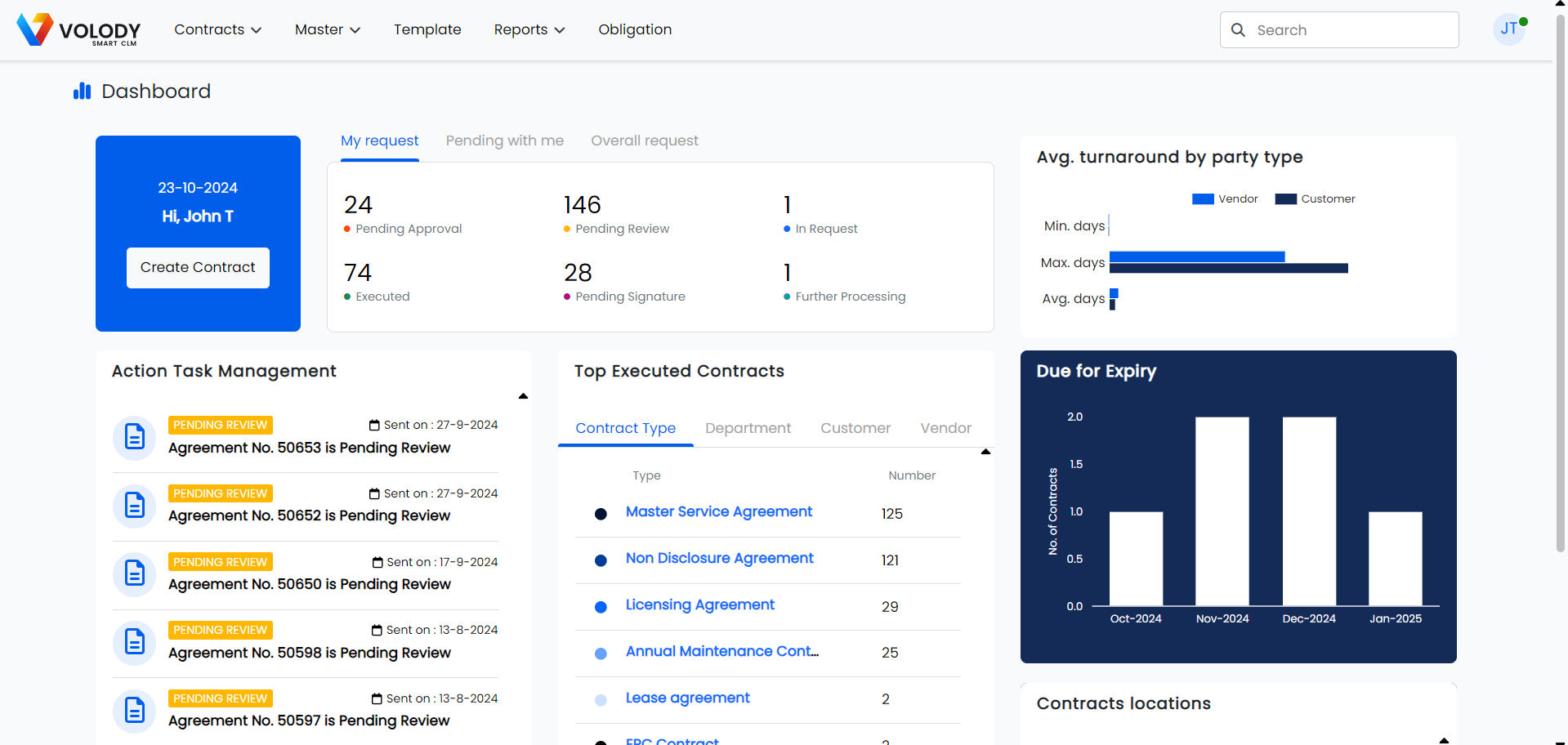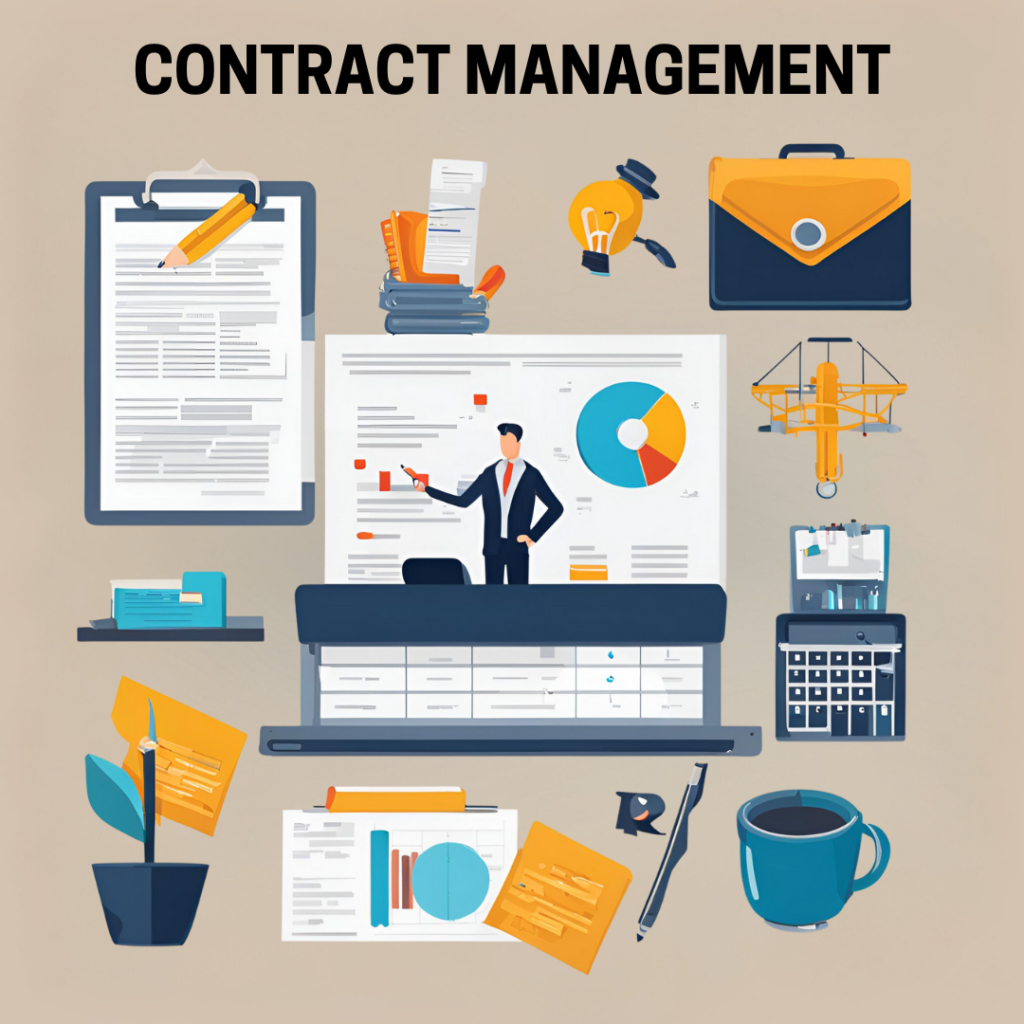Contract management is a critical process for businesses, ensuring that legal agreements are properly created, executed, and adhered to throughout their lifecycle, with a focus on adhering to the contract terms. From the initial creation to ongoing management and eventual conclusion, effective contract management reduces legal and financial risks while fostering strong business relationships. By maintaining a structured approach, companies can protect their interests and avoid costly mistakes that might arise from poorly managed agreements.
This blog provides a comprehensive overview of contract management, detailing its definition, key components, and the importance of streamlining the process. It also explores the challenges of traditional contract management, the benefits of automation, and best practices for effective contract oversight.
What is Contract Management?
Contract management is the full process of handling legal agreements within the legal department. This process includes every step, starting from the beginning and creation to execution, ongoing management, and finally ending the contract. It is a methodical way to take care of contracts. This ensures that everyone involved meets their contractual obligations, while also reducing financial and legal risks.
Effective contract management is more than just keeping and finding new contracts. It means watching contracts closely, checking how well they are doing, and finding risks before they become problems. When businesses use strong contract management methods, they can improve their new contracts, ensure rules are followed, and get better results in their work.
Related Article: Best Contract Management Software: Top 10 CLM in 2024
Why is Contract Management Important?

Effective contract management is important for businesses of any size. It offers many benefits that affect different parts of a business. By using strong contract management practices, businesses can improve operations, reduce risks, and boost their financial results.
Good contract management creates trust and honesty between everyone involved. This includes employees, customers, vendors, and partners. When businesses stick to their contractual obligations and show they value ethical practices, they can build better relationships. This helps improve their reputation in the market.
Risk Mitigation and Compliance
Contracts can have contract risks. If we do not manage them well, it can cause money loss, legal issues, and harm to our reputation. Good contract management is very important in reducing risks. It helps us assess risks completely, spot warning signs, and put in place necessary protections.
Contract management software usually has tools for compliance tracking and reporting. This helps businesses follow all their legal and compliance requirements. By automating tasks linked to compliance, like reminding of deadlines and keeping audit records, organizations can reduce the chance of human error. This way, they can keep a strong compliance position.
Enhancing Business Relationships
Well-managed contracts are very important for building and maintaining good business relationships. When contracts are clear and fair, they create trust and openness among key stakeholders. Contract management processes help everyone communicate and work together well. This way, all parties know what to expect and their responsibilities.
By keeping an eye on contract performance and quickly solving any problems that come up, businesses can show they care about keeping their promises. This helps them build long-lasting and helpful relationships with customers, vendors, and partners.
Related Article: 7 Ways You Can Use ChatGPT for Contract Negotiation
Traditional Contract Management Challenges
Traditional ways of managing contracts are not working well anymore. Today’s business world moves fast. Using paper documents, spreadsheets, and emails can cause problems. These old methods can slow down work, create more mistakes, and make it hard to see important contract information. This lack of clear information affects making good decisions.
The digital change has opened up new options for contract management. These modern solutions provide automation, central contract storage, and real-time teamwork. When organizations switch to cloud-based contract management software, they can make their processes smoother, reduce risks, and improve how they work overall. These platforms let users securely store contracts, track important dates, handle approvals, and create reports easily. This contract management software transforms how businesses manage their agreements in the digital age.
Manual Processes and Inefficiencies
Manual contract management takes a lot of time and often leads to mistakes. From creating contracts to keeping track of deadlines, every step requires a lot of work, which makes errors more likely. Poor processes can be expensive if deadlines are not met or terms are ignored. Without automation, it becomes difficult to manage contract versions well, and this raises the chance of relying on old information.
Lack of Centralized Contract Repository
Scattered contracts make it difficult to keep track of versions, statuses, and information. Putting contracts in one central place, such as a central repository, is very important. This helps stop wasted time and lost documents. Searching for information by hand uses up time and resources. This can slow down productivity and delay business tasks.
Related Article: WCC Top 10 Negotiated Terms of 2024
Transitioning to Modern Contract Management
To deal with the problems of old ways of managing contracts, businesses are now using modern technology solutions. This change is happening because they need better efficiency, better compliance, and a clearer view of contract data.
These automated solutions provide many benefits. They help businesses improve their contract processes. They also lower the amount of manual work needed. This gives companies better control over their contractual obligations.
Overview of Automated Contract Management
Automated contract management uses technology to make managing contracts easier. It uses special software to perform tasks automatically, store documents in one place, enhance teamwork, and give quick insights. By automating tasks such as contract actions, contract creation, reviewing, and approval workflows, businesses can save time and energy while increasing accuracy.
Key Technologies and Software Solutions
A lot of technologies help modern contract management solutions. They make these solutions smarter and faster now. Some important technologies are:
- Contract management software: This software helps organize and manage all stages of contracts. It includes tools for automation, teamwork, reporting, and analyzing the contract lifecycle.
- Artificial intelligence (AI): AI tools can look at contract data. They find possible risks and chances. They can also help write and check contracts.
- Electronic signature: Electronic signatures provide a safe way to sign documents online. They are legally binding and remove the need for paper. This makes contract execution quicker.
- Cloud computing: Cloud contract management solutions are easy to scale and cost-effective. They let businesses access their contracts from anywhere with an internet connection.
Related Article: Contract Versions: A Guide to Easily Tracking Each Update
Contract Management Best Practices
To make contract management more effective, it’s important to set and follow well-known best practices. These practices help organizations create a clear and efficient way to manage contracts. This reduces risks and ensures that they follow all rules.
By following these best practices, organizations can build a strong base for good contract management. This can lead to better efficiency, lower risks, and greater compliance during the contract lifecycle.
Standardizing Contract Processes
Standardization is important for keeping things the same, saving time, and following rules in contract management. Having clear steps during the contract lifecycle helps avoid confusion, improves communication, and reduces mistakes. Using standard templates makes sure everything follows policies and legal needs, making it easier to create contracts. Clearly defined approval workflows guarantee that the right people review the contracts. This lowers risks and helps maintain compliance.
Emphasizing Contract Analytics and Reporting
Data-driven decision-making is very important for better contract management. It helps improve business results. When organizations use contract analytics and reporting, they can find useful information in their key contract data. This helps them make smart choices.
Contract management software comes with tools for creating custom reports on important contract data. These reports show how well contracts are performing, along with financial details, compliance status, and other key information related to contract monitoring. This helps organizations keep an eye on their important KPIs, check their progress, and find areas that need improvement.
Related Article: A Guide to Excel-Based Contract Management
Effective Contract Management Strategies

Creating and using good contract management strategies is very important for any organization that wants to get the most value from its contracts, including understanding contract value. These strategies need to cover the whole contract lifecycle. They should also focus on important things like reducing risks and following the rules. At the same time, they should fit with what the organization wants to achieve in its business goals.
Organizations can reduce risks, improve compliance, and make their contracts better by taking a smart and active approach to managing contracts.
Streamlining the Contract Lifecycle
An effective contract management strategy helps make the contract lifecycle smoother by finding and fixing delays during contract renewal. Automating tasks, like using templates that are already approved and creating approval workflows, can shorten the time needed. This gives managers more time to work on important tasks.
Enhancing Collaboration and Communication
Effective contract management needs everyone to work together and communicate well. Set up clear ways to share information. Use one main platform for everyone to access data. This will help build strong relationships and stop delays.
Related Article: Free Contract Management Software | Top 7
The Benefits of Automating Contract Management

Automating contract management processes offers many benefits. It helps an organization work better, follow rules, and improve profits. By using technology to make contract tasks easier, businesses can save time and resources. They can also reduce mistakes and have better control over their contractual obligations.
Automated contract management systems give businesses current access to contract data integrated with enterprise systems. This helps them make better decisions. They can spot risks and opportunities. It also helps improve their contract performance overall.
Improved Efficiency and Productivity
Automating management processes for contracts makes things easier and quicker. It lessens the need for manual work and removes hold-ups in the process. This helps in speeding up how fast contracts are completed. Automated reminders for deadlines keep tasks on track, cutting down on delays and issues. Because of this efficiency, workers can concentrate on important tasks like improving contracts and analyzing risks. This adds value to the organization.
Better Compliance and Risk Management
Compliance is very important in contracts. Automation helps to meet legal needs. Contract management software with automated compliance tracking keeps an eye on contracts, ensuring data security. It checks for certain clauses, rules, and policies. Automated risk assessments can spot possible risks early. This helps to create plans that can stop legal problems before they happen. These systems also provide audit trails. This makes it easier to keep accurate records for compliance.
Related Article: Ultimate guide of Contract Repository Systems
Who Benefits from Contract Management Automation?

The benefits of contract management automation reach many departments and people in an organization. Legal and contract management teams see big advantages in terms of improved contract language. Other departments like procurement, finance, and sales also enjoy better contract processes and clearer visibility.
Contract automation helps organizations work better. It reduces risks and improves financial results. This change is good for the whole organization.
Legal Teams and Contract Managers
Legal teams and contract managers, including legal professionals, are essential in managing contracts. Automation helps them a lot by making tasks easier. This includes drafting, reviewing, and negotiating contracts. CLM provides a central place for all assignments. This saves time and cuts down on mistakes. Tools like assignment templates and approval workflows make work more efficient. This allows them to focus on important tasks like checking legal risks and improving assignments.
Procurement and Supply Chain Departments
Procurement and supply chain teams, including procurement teams, rely on assignments to get goods and services. Automating this makes vendor management easier. It improves compliance and helps lower costs. Automated systems help to track vendor performance. They also check on important metrics and make sure policies are followed. These systems support timely renewals and changes. This reduces problems in the supply chain, which helps business continuity.
Related Article: What Is Contract Negotiation? Clear Strategies & Expert Tips
Improving Contract Management with Volody’s CLM

Contract management can be greatly improved by using advanced technology like Volody. When you use Volody in your contractual processes, it can help make work easier, boost efficiency, and lower risks. Volody uses artificial intelligence and machine learning to automate regular tasks. This includes assignment creation and approval workflows, which help reduce human error. Volody serves as a central source of truth for all assignment data. This means key stakeholders can access real-time information easily. Using Volody can change your contracting process, making it smarter and more productive.
Challenges Addressed
Volody’s contract management solutions help organizations that have difficulties with old-fashioned, manual contract management. They offer a centralized place to keep assignments, automate routine tasks, and provide better reporting tools. This way, Volody removes inefficiencies and helps businesses manage their assignments more effectively.
Volody helps reduce risks from manual tasks. This includes mistakes by people, missing deadlines, and problems with following rules. The platform also solves issues with teamwork and communication. It offers a single place for everyone involved to find, follow, and handle assignments. This way, all parties stay informed and work together effectively.
Key Outcomes and Improvements
Using Volody’s contract management software changes how businesses manage assignments. This results in big benefits for efficiency, compliance, and risk management. Companies see quicker assignment cycle times. They also have less red tape and better accuracy. Additionally, the software offers clearer views of assignment data.
|
Outcome |
Improvement |
|
Efficiency |
Faster creation, review, and approval processes. |
|
Compliance |
Automated compliance tracking and reporting, reducing the risk of penalties. |
|
Risk Management |
Proactive risk identification and mitigation, minimizing potential disputes. |
|
Collaboration |
Improved communication and collaboration among stakeholders throughout the contract lifecycle. |
Related Article: How to Simplify Contract Review with AI? Comprehensive Guide
Conclusion
In conclusion, contract management is very important for business operations. It helps ensure rules are followed, reduces risks, and builds better relationships. Moving to modern automated solutions can make the contracting process easier, improve efficiency, and increase productivity. By standardizing tasks, focusing on analytics, and using technology, organizations can manage their assignments better. Automation helps legal teams, procurement departments, and the whole business. Tools like Volody solve problems, improve results, and show noticeable benefits. Embrace the future of this to help your organization succeed.
FAQs
What is the main purpose of contract management?
Contract management focuses on making sure that everyone follows the rules in assignments from start to finish. Its goal is to reduce risks for all important people involved. This includes handling the writing, signing, following rules, and measuring the success of assignments.
How does CLM software improve efficiency?
Contract management software helps make work easier by streamlining administrative tasks and automating simple tasks. It allows for quicker tasks like contract creation, approval workflows, and deadline reminders. This way, people can work together in real time and spend less time on manual work.
What are common mistakes in contract management?
Common mistakes in managing contracts are:
- Human error happens during manual processes.
- Missing deadlines.
- Having poor version control.
- Not addressing contract disputes properly.
Related Article: How to Simplify Contract Review with AI? Comprehensive Guide
Conclusion
In conclusion, contract management is very important for business operations. It helps ensure rules are followed, reduces risks, and builds better relationships. Moving to modern automated solutions can make the contracting process easier, improve efficiency, and increase productivity. By standardizing tasks, focusing on analytics, and using technology, organizations can manage their assignments better. Automation helps legal teams, procurement departments, and the whole business. Tools like Volody solve problems, improve results, and show noticeable benefits. Embrace the future of this to help your organization succeed.
FAQs
What is the main purpose of contract management?
Contract management focuses on making sure that everyone follows the rules in assignments from start to finish. Its goal is to reduce risks for all important people involved. This includes handling the writing, signing, following rules, and measuring the success of assignments.
How does CLM software improve efficiency?
Contract management software helps make work easier by streamlining administrative tasks and automating simple tasks. It allows for quicker tasks like contract creation, approval workflows, and deadline reminders. This way, people can work together in real time and spend less time on manual work.
What are common mistakes in contract management?
Common mistakes in managing contracts are:
- Human error happens during manual processes.
- Missing deadlines.
- Having poor version control.
- Not addressing contract disputes properly.





